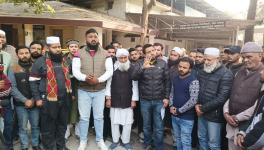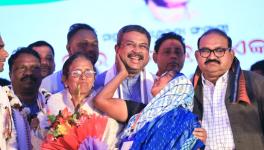Failure of NSA Level Talks and Shadow -boxing of the Government
Newsclick interviewed Seema Mustafa on the recent cancellation of the NSA-level talks with Pakistan by India. According to Seema, the BJP government wants to highlight the issue of Pakistan linked terrorism in national politics with a war of words with Pakistan on the backdrop of the Bihar elections coming up soon. The government is linking Kashmiri Muslims to violence and terrorism and avoiding the discussion of Kashmir itself from its agenda. She says if the government really wanted to move forward with the joint statement made in Ufa, it would have been done with enough background preparations before arranging such NSA talks. This haste in cancellation itself shows the government is not interested in going forward with peace.

Rough Transcript:
Rishab Bailey - Hello and welcome to Newsclick. The Ufa statement issued recently by India and Pakistan was seen as the beginning of an improved relationship between two countries. However the cancellation of talks this week between the NSAs of two countries primarily gave to disagreement on what issues to discuss during the talks; has meant again no headway as far as the peace talks are concerned. To discuss the cancellation of these talks between India and Pakistan, we are joining by Seema Mustafa, Journalist with Citizen and someone who covered the India-Pakistan issue extensively. Now, do you believe that the NSA level talks would have actually accomplished anything substantial? It appears to great extend as those talks were merely PR exercise for both countries to exercise these talks of informations on these supposed terrorists that each one is harboring. How will the cancellation of talks actually change or impact the relationship that we currently have with Pakistan?
Seema Mustafa - See once they agreed in Ufa that they are going to talk, the two Prime Ministers and they were at the highest level, Narendra Modi and Navas Sheriff and after that, you expected there will be a lot of work done to make the NSA level talks fruitful. It was very clear even before the cancellation that, there was no back channel established and all the problems that the two countries have are usually sorted out in back channels and then they brought in. So you know we started saying that inspite all the fire fighting and stabbing each other, the accusations, the hurling off, they had not really done anything to make these talks fruitful. So lot of people were saying why you are going ahead with them anyway?
RB - As you mention the cancellation of the talks has come with a lot of chest thumbing accusations, back stabbing from each other so on. As you point out, two heads of the state had agreed on talks going forward. So what has actually changed so as you render the talks impossible. I mean there is a line been peddled by part of army, that the Pakistan army never brought into these talks which is why they were doomed to fail from the very beginning. Do you think that is correct analysis?
SM - No. I don't think it is just the army. I think it was both sides. You know it is always both sides and we always blaming the other. But in Ufa, the statement was drafted by the two foreign secretaries. I think either Navas Sheriff or his foreign secretary or both were sleeping. Because that joint statement made it very clear that the NSA would meet on terrorism. There was no mention in that entire statement about Kashmir. While there was a larger mention of outstanding issues, but the specific talks, I mean Sushma Swaraj, our minister was right on that. That the NSA talk was on terrorism, where is Kashmir come in? So when Navas Sheriff went back, the army, the vested interests and everybody went crazy, saying that you given-in terrorism but where is Kashmir? and how can you have NSA level talks after such a long time without Kashmir? And then noises on Kashmir was started being made right from that time. Now if we had back channel, you could have saved it. You know both sides could have started saying, will OK first round on terrorism, second round on other issues orbrought in Kashmir, towards OK, will lower it. will bring it. You wasted whole diplomatic ways.
RB - Why the back channel talk never got underway in the first place?
SM - Because I don't think so we are interested. May be either side was not interested. But I can't say about Pakistan, we can say about India. We have our Bihar election coming in. For us, the talks only had meaning if they became a stage for talking on terrorism. For us the talks had no meaning if they became a stage which went against the BJP government's constituency.
RB - So given all that how do you look at where the Indian government has been dealing with the entire Hurryat issue? All the issue of these separatists? Because they made it very clear that they don't want Pakistanees to meet them. Despite the fact that they evensupposedly doing that for many many years.
SM - Ridiculous. You know this is usual, small little constituency in the establishment which is always been there, right from the time when the talks was established, whether it was Vajpayee or whether it was Manmohan Singh or before that, Gujral, which is always advocated this very very hard line. At that establishment that really comes out of the intelligent agencies, because obviously they are fire fighting all the time and they don't want dialogues. The Prime Minister is before had been very pragmatic, they are been very clear that OK you know they are meeting the other Indians so they also meeting the Hurriyat. You know if you give them a special status then you are trying to say that they are somebody else. I mean good politics itself would indicate that you are having a reception, you are calling five thousand people, call them also. And I think the tragedy of the whole thing has been, in so far as politics in the Indian government is concerned, that you revived Pakistan and Kashmir, where as the Kashmiris were really not at all looking at Pakistan. If they were alienated from New Delhi, they were equally alienated the younger generation from Islamabad, which was after years and the Hurriyat, because that become sort of irrelevant.
RB - Yes, they have been marginalized for so many years. So but what do you therefore make of the Modi govt stands on Pakistan as a whole? If you look at the last year of his Prime Minister-ship, starting with the invitation to Navas Sheriff, they have met a few times at international events and now these talks which as you said, looks like they were never supposed to meet very early. What do you make of the Modi government relationships? Do they know what they are doing?
SM - Yes, in fact I am not one of those who thinks that, they don't know what they are doing. I think they are coming out of the same constituency, which they had before, which is Pakistan-Indian Muslim-Kashmir-Terrorism-Anti-national. So all these thread that they keep weaving and they weave in the domestic violence, communal violence. So it is all the time this linkages that they make. So for them, Pakistan policy feeds into these linkages. So how can you have peace when you have to say that Pakistan is your enemy and you have to say that the Indian Muslim is connected with Pakistan and you have to say that every single Kashmiri is terrorist because of his links or his independent stand? So if you have taken these extreame positions of about Indian citizens then you oviously going to take; for you peace doesn't really work as a doctrine but conflict and war does.
RB - But that is incredibly worrying them for long term perspective?
SM - Well It is, it is. You know by this cancellation and by this kind of attitude, if it doesn't change and if the diplomacy is sort of you know ' Narendra Modi is the Prime Minister of India ', you know that itself a big thing to have happen and he should realise his responsibility towards India but if that doesn't really work then obviously it is very worrying because you are pushing the Kashmiris with back againstwall again. And you are making them feel that they are constricted and confined and you have also now given Pakistan a handle and the Pakistan militia a handle to rev up Kashmir again in all proper civil base. You see the talks were constantly had been able to strengthen the civilians' side in Pakistan and they had been able to then tell the military you know stay out of this. But rather than that, now we are strengthening the military and I think we are going to see a very reved-up kind of Pakistan offensive on Kashmir.
RB - So where do you see things going in the short-medium term then? I mean when or do we expect of get room again some point of time, on what basis? because now have taken such hard lines. We created red lines of what we will talk about what we won't talk about, preconditions this, that and other. There has to be a step back from both sides which you presumably not go down well with your domestic ?
SM - Yes, I think now the next meeting is coming in New York. I mean the next chance of encounter is in New York General Assembly in September. Let they meet. Whats the point of meeting unless you know why you are meeting and unless you are taking peace process forward? One is not interested in Navas Sheriff coming, over taking or Narendra Modi is going for some function there. We are interested in the two meetings and substantial dialogues and if they are not able to start that, whether they meet or they don't meet is quite matter of indifference for the peace loving people of both the countries and by the way there is a huge peace constituency which somehow get ignored in the media, which is not picked up in this historical shows on television on either side. The impression is given as the people on the both side only want war. Where as I would say that a huge majority want peace. You know only this handful of guys who control the media who want war and they are sitting in air condition offices and sitting in air conditioned rooms, and they are not fighting.
RB - I can't interview more. I think that is an excellent note to end this interview. Thank you so much Seema for being with us today.
SM - Thank you.
DISCLAIMER: Please note that transcripts for Newsclick are typed from a recording of the program. Newsclick cannot guarantee their complete accuracy.
Get the latest reports & analysis with people's perspective on Protests, movements & deep analytical videos, discussions of the current affairs in your Telegram app. Subscribe to NewsClick's Telegram channel & get Real-Time updates on stories, as they get published on our website.
























